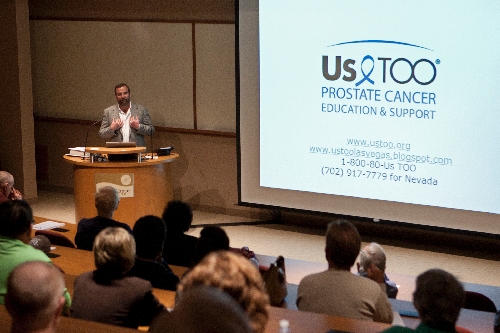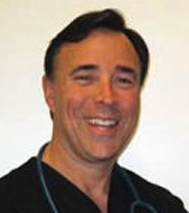Doctor accused of reusing needle guides leaves patients angry
Lee Horstein remembers the phone call from Dr. Michael Kaplan.
"It was after my second prostate biopsy from him about four years ago," the 69-year-old retired businessman said as he sat in an auditorium at the Nevada Cancer Institute. "I had a feeling that it wasn't going to be good news when the doctor himself was on the phone."
It wasn't. But Horstein recalls that the urologist tried to couch the news in a way that would be less painful.
"He said, 'Lee, you have a little cancer. But you're not in danger of dying. We can take care of it.'
"I could tell he was concerned about my feelings, so I tried to joke with him: 'Doc, is that like being a little pregnant?' "
Shortly before the start of the USTOO prostate cancer support group Thursday evening, Horstein admitted he was finding it difficult to square the caring doctor he long respected with the one the Nevada State Medical Board has suspended for reusing single-use only needle guides. That practice put patients at risk for blood-borne diseases that include HIV and hepatitis C.
"This just makes no sense," said Horstein, who is vice president of the support group. "It's like one and one equals three. How can a guy be so concerned and caring for his patients and then do something like that? Why would he put his entire practice and reputation at risk by reusing a $10 item? I know he admitted it, but I feel there has to be more to this. I can't believe he could knowingly do such a thing. If someone does something like that knowingly, as far as I'm concerned, it's attempted murder."
Questions abound since Kaplan's medical license was suspended last Monday, particularly after the medical board released details that sound like something out of a horror movie.
According to the suspension order filed against Kaplan, he only stopped reusing single-use only needle guides for prostate/rectal biopsies when they became "too bloody."
"If somebody does do something like this, why would you only think they just did it recently?" Horstein said as about 50 men, many with their wives, entered the auditorium to discuss both the Kaplan situation and new treatments for the disease. "I don't believe Dr. Kaplan could have done anything to me, but I'm going to get tested."
Though they did not undergo prostate biopsies, other patients of Kaplan's are fearful he might have taken shortcuts during other procedures, so they are being tested for HIV and hepatitis.
Still others wonder if Kaplan's associate, Dr. Brian Golden, could have done the same thing as his partner, although the medical board says no.
"We have found no irregularities in Dr. Golden's work," said Doug Cooper, executive director of the medical board.
Physicians are worried that the current scandal -- the third involving the local medical community in recent years -- is causing Southern Nevadans to lose faith in the medical profession.
The Kaplan case comes after a hepatitis C outbreak linked to endoscopy clinics and after court cases involving collusion between doctors and lawyers.
"This has a lot of reverberations," said Dr. Joseph Thornton, an associate professor of surgery at the University of Nevada School of Medicine.
PROSTATE CANCER
What makes the situation with Kaplan all the more difficult, according to Tony Crispino, president of the USTOO support group, is that many of Kaplan's patients already must deal with the emotionally draining diagnosis of prostate cancer.
"You go through so much when you get that diagnosis," he said. "You're like a deer caught in the headlights. You have to worry about incontinence and about erectile dysfunction if you have surgery. It's easy to be scared to death. Many men can't talk about it."
According to government statistics, more than 200,000 men are diagnosed with the disease in the United States each year and more than 30,000 die from it. Except for skin cancer, it is the most common cancer in American men.
Dr. Nicholas Vogelzang, a Comprehensive Cancer Centers of Nevada oncologist who answered questions at the support group meeting, said there are between 600 to 800 newly diagnosed cases of prostate cancer in Southern Nevada each year.
"It's not easy to deal with," Vogelzang said.
The prostate is a gland in the male reproductive system, making and storing a component of semen. A healthy prostate is about the size of a walnut.
Located in the pelvis, under the bladder and in front of the rectum, the prostate surrounds part of the urethra, which empties urine from the bladder.
Prostate cancer forms in the tissues of the prostate, with symptoms often only surfacing after the disease has spread.
Symptoms include not being able to urinate; needing to urinate often; difficulty getting an erection; blood in the urine or semen; and frequent pain in the lower back, hips or upper thighs.
Las Vegas urologist Joseph Candella said the American Urological Society recommends that annual prostate cancer screening begin for most men at age 50.
For African-American men and those with a family history of the disease, who have a greater risk of the disease, Candella said screening should begin at age 40.
The two screening tests commonly used to detect prostate cancer in the absence of symptoms are the digital rectal exam, in which a doctor feels the prostate through the rectum to find hard or lumpy areas, and a blood test that detects a substance made by the prostate called prostate specific antigen (PSA).
Together, Candella said, these tests can detect many "silent" prostate cancers than have not caused symptoms.
An elevated PSA -- Candella says what is an acceptable level depends on the patient's age -- and a digital rectum exam that discovers lumps generally results in a prostate biopsy, which is the only way prostate cancer can be confirmed.
"I would hope that this incident (of Kaplan admitting to a breach of infection control) does not keep men from getting screened," Candella said. "We don't want mass hysteria when lives can be at stake. People can be confident that physicians generally follow standardized techniques."
It is the men who underwent biopsies from Dec. 20, 2010, through early March who are now at risk for blood-borne diseases, according to authorities.
A source familiar with the medical board's investigation of Kaplan said the three-month time frame was settled on because "it appears that's when he started using the (plastic) disposable needle guides for prostate biopsies that are only supposed to be used one time."
Candella said he favors reusable stainless steel needle guides, which can be sterilized through special cleaning solutions and by subjecting them to high pressure saturated steam at temperatures reaching more than 185 degrees Fahrenheit.
Prostate biopsy procedures are invasive, going through the anus to the rectum.
The single-use needle guides, plastic sheaths through which needles are directed to obtain biopsy material, regularly come in contact with blood and body fluids, which could be passed to another patient if reused.
At this time, no cases of disease transmission have been identified
MALPRACTICE CASES
Alfred Slensky, 60, who was accompanied to the support group meeting by his wife, Hope, a breast cancer survivor, had a prostate biopsy by Kaplan in January. At the meeting, he recounted how the biopsy found he didn't have cancer, but that he suffered anyway.
"I ended up losing four pints of blood because an artery was hit during the procedure and I had to go to the hospital," Slensky said. "I was pleased that Dr. Kaplan apologized for that. But I'm not pleased that I have to get tested for hepatitis and HIV."
Slensky said he also isn't pleased that Kaplan told him at the hospital that none of his patients ever suffered major complications when he operated on them in the past.
On Wednesday the Review-Journal reported that Kaplan has been a defendant in at least nine medical malpractice cases since 1995, the most recent coming in 2007, according to District Court records.
In that case, a woman sued the doctor after her husband bled to death following a 2006 operation to remove his prostate. An artery and vein were hit during the procedure, causing massive blood loss. The case was dismissed after an apparent settlement.
In a 2002 case, another woman settled her lawsuit against Kaplan for a total of $1.25 million after he operated on the wrong side during a surgery to fix an obstructed ureter and, in a follow up surgery, punctured the woman's bowel.
"I think it's important that a doctor level with you," Slensky said. "You need to have trust."
Attempts to reach Kaplan for comment were unsuccessful.
HIV AND HEPATITIS TESTS
Harvey Levy, a former patient of Kaplan's, said he never had a biopsy from Kaplan but he is getting tested for the dangerous viruses anyway.
"I just had procedures from him for an enlarged prostate," Levy said. "But I can't see how a doctor would be conscious of infection control on one procedure and not on another. I have to get tested."
Iris Rose said her 65-year-old husband, Mark, now feels like "it's deja vu all over again."
She said her husband had to get tested for hepatitis and HIV three years ago after her husband had a colonoscopy at one of Dr. Dipak Desai's endoscopy clinics.
More than 40,000 patients of the clinics were notified they should be tested for hepatitis C and HIV after authorities saw his staffers reusing syringes and single-dose vials of anesthetics.
"Now he has to get tested for the same dangerous things after a prostate biopsy," Rose said. "Thank God he doesn't have cancer, but this is just plain cruel. I don't know why these doctors can't do the right thing."
Thornton said the situation with Kaplan couldn't come at a worse time. He said doctors were just beginning to feel like both the Desai situation and the "medical mafia" scandal -- where local lawyers and doctors manipulated personal injury cases during the last decade -- were beginning to fade out of the public consciousness and doctors were getting a decent reputation again.
"We just keeping hit," he said. "Doctors stand and fall together. And this hurts us all. I keep hearing again that people want to go out of town to be treated."
For about an hour of the two hour support group meeting, men and their wives asked questions arising out of the Kaplan suspension.
For the second hour they talk about new treatments for prostate cancer.
Lew Musgrove, the first president of the USTOO support group, reminded those on hand to keep an open mind about Kaplan.
"Remember that Dr. Kaplan was the man who asked me to start this group," Musgrove said. "He's always been concerned about men going through this difficult cancer. He bent over backwards to make sure this group worked. That doesn't sound like a man who wanted to hurt people."
Contact reporter Paul Harasim at pharasim@reviewjournal.com or 702-387-2908.























